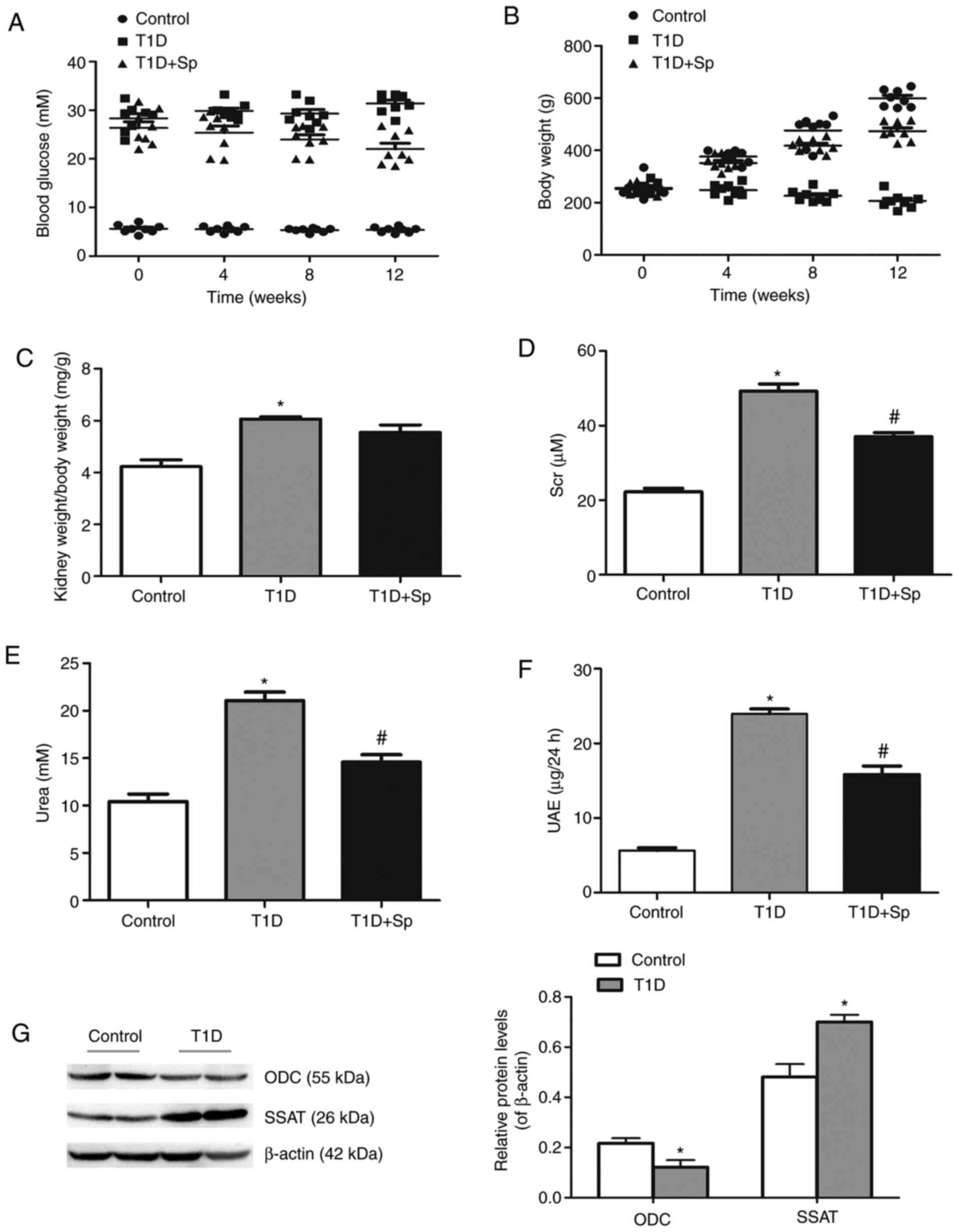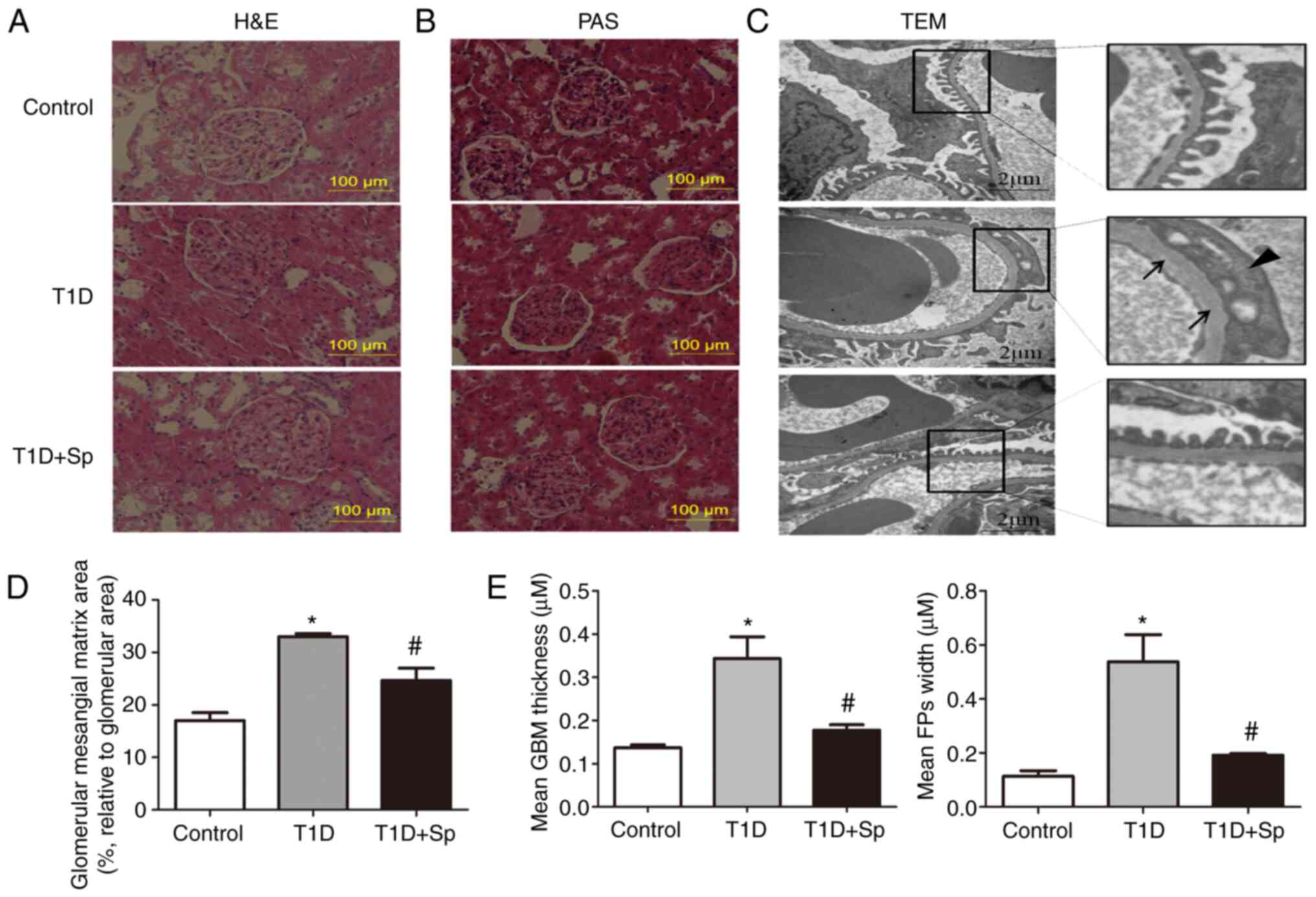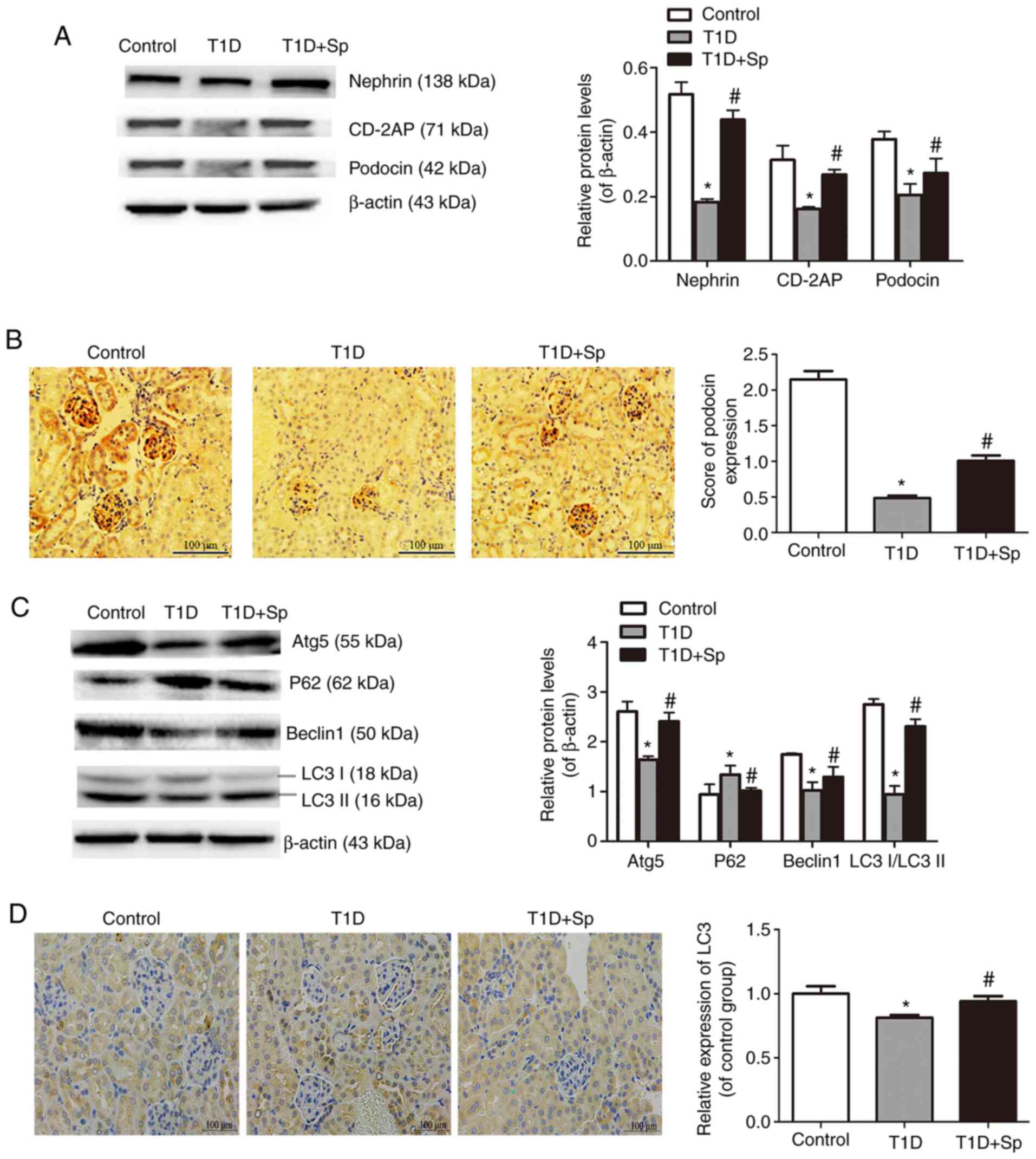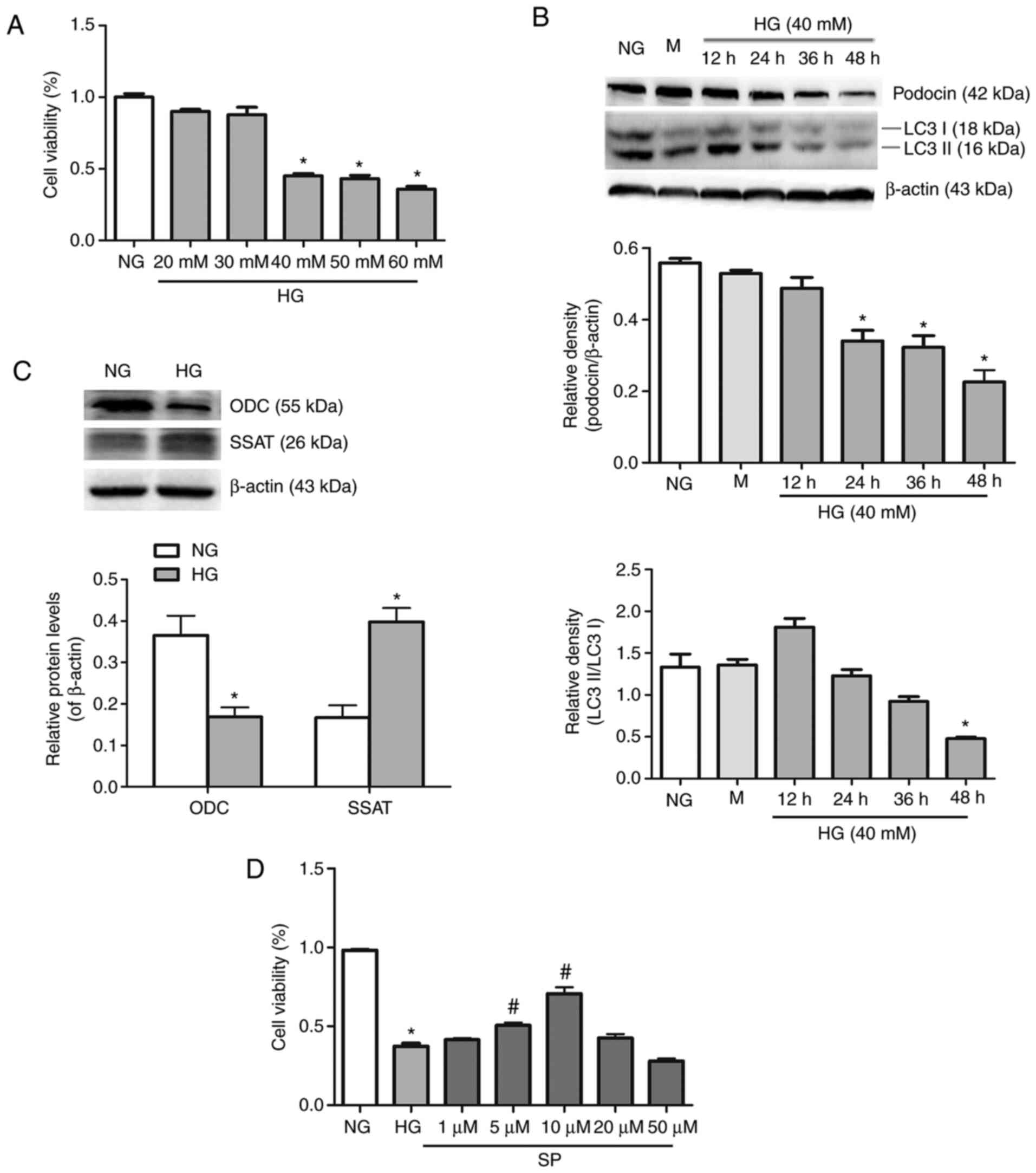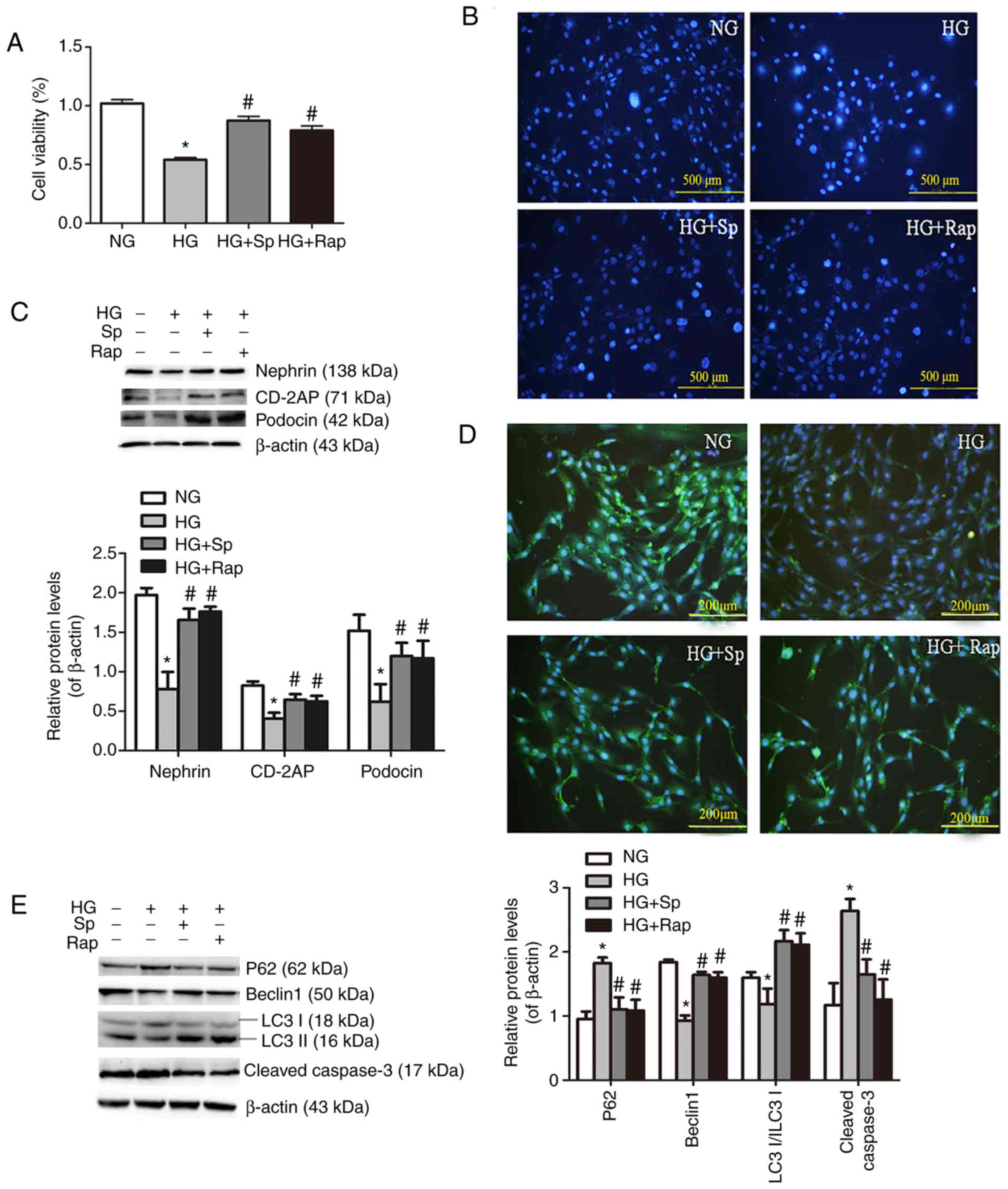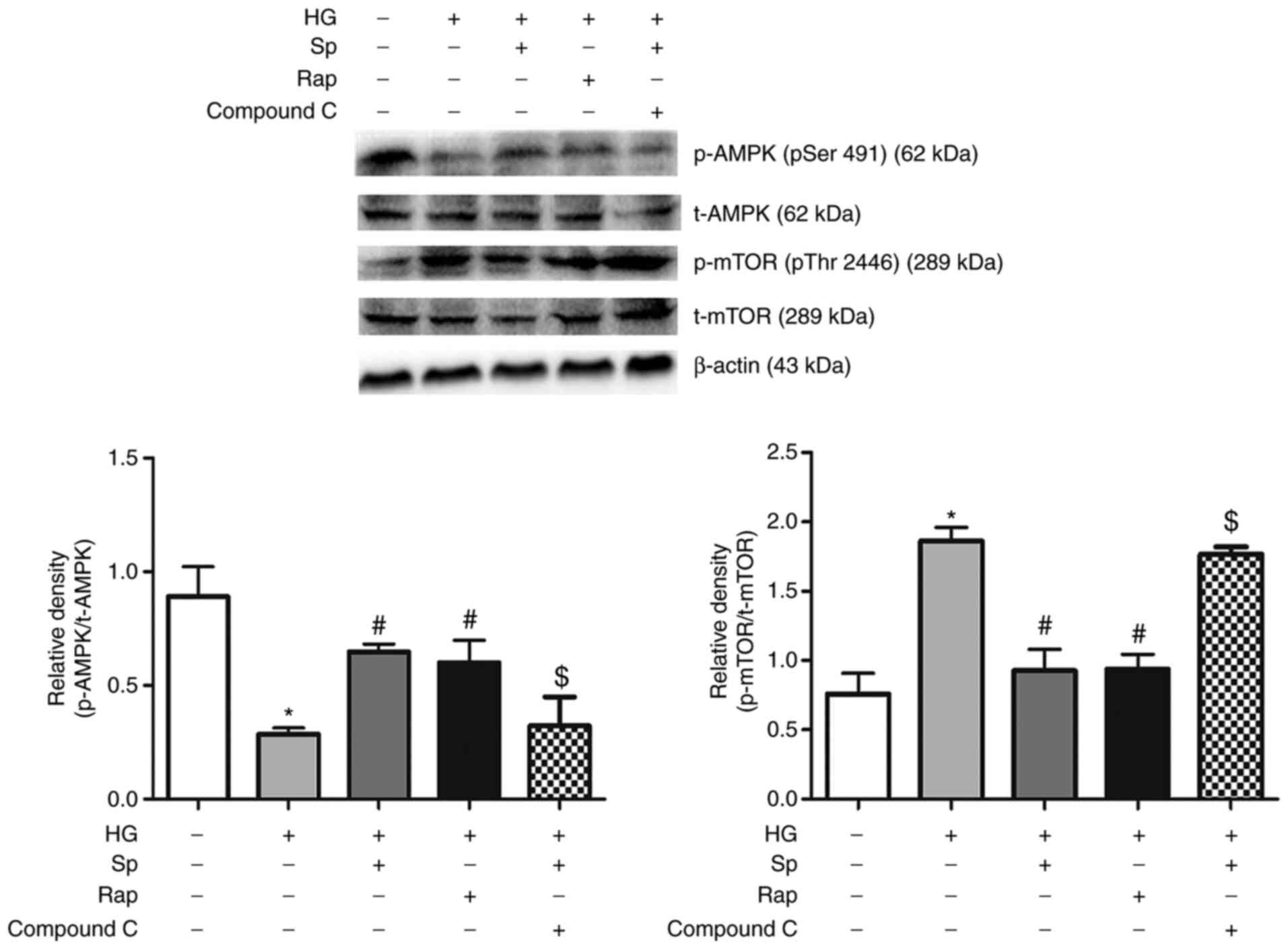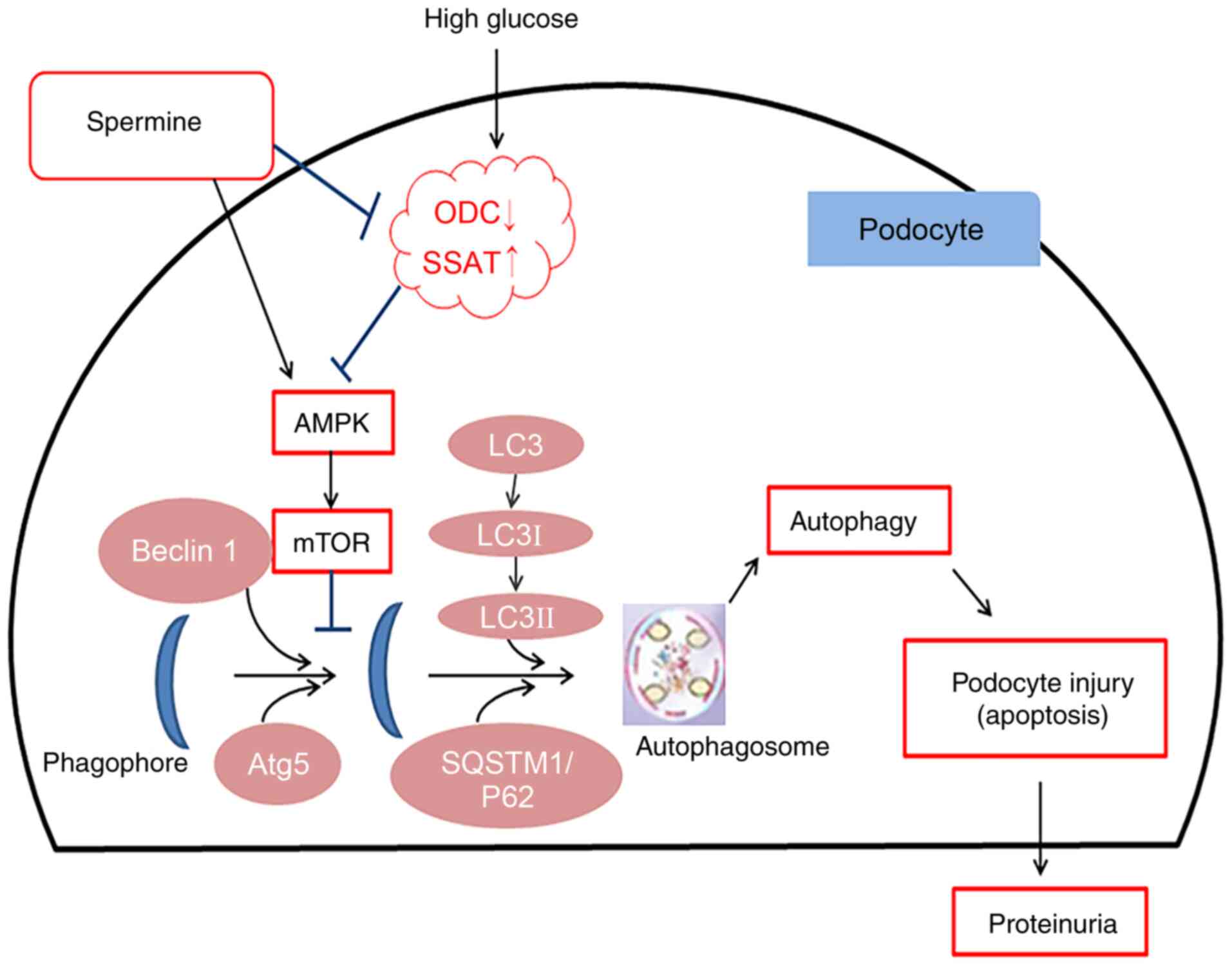|
1
|
Saran R, Li Y, Robinson B, Ayanian J,
Balkrishnan R, Bragg-Gresham J, Chen JT, Cope E, Gipson D, He K, et
al: US renal data system 2014 annual data report: Epidemiology of
kidney disease in the united states. Am J Kidney Dis. 66(Suppl 1):
SviiS1–305. 2015. View Article : Google Scholar : PubMed/NCBI
|
|
2
|
Xiao L, Wang M, Yang S, Liu F and Sun L: A
glimpse of the pathogenetic mechanisms of Wnt/β-catenin signaling
in diabetic nephropathy. Biomed Res Int. 2013:9870642013.
View Article : Google Scholar
|
|
3
|
Brownlee M: The pathobiology of diabetic
complications: A unifying mechanism. Diabetes. 54:1615–1625. 2005.
View Article : Google Scholar : PubMed/NCBI
|
|
4
|
Giacco F and Brownlee M: Oxidative stress
and diabetic complications. Circ Res. 107:1058–1070. 2010.
View Article : Google Scholar : PubMed/NCBI
|
|
5
|
Bae DH, Lane DJR, Jansson PJ and
Richardson DR: The old and new biochemistry of polyamines. Biochim
Biophys Acta Gen Subj. 1862:2053–2068. 2018. View Article : Google Scholar : PubMed/NCBI
|
|
6
|
Wallace HM, Fraser AV and Hughes ZA: A
perspective of polyamine metabolism. Biochem J. 376:1–14. 2003.
View Article : Google Scholar : PubMed/NCBI
|
|
7
|
Michael AJ: Polyamines in eukaryotes,
bacteria, and archaea. J Biol Chem. 291:14896–14903. 2016.
View Article : Google Scholar : PubMed/NCBI
|
|
8
|
Kalac P: Health effects and occurrence of
dietary polyamines: A review for the period 2005-mid 2013. Food
Chem. 161:27–39. 2014. View Article : Google Scholar : PubMed/NCBI
|
|
9
|
Lane DJR, Bae DH, Siafakas AR, Suryo
Rahmanto Y, Al-Akra L, Jansson PJ, Casero RA Jr and Richardson DR:
Coupling of the polyamine and iron metabolism pathways in the
regulation of proliferation: Mechanistic links to alterations in
key polyamine biosynthetic and catabolic enzymes. Biochim Biophys
Acta Mol Basis Dis. 1864:2793–2813. 2018. View Article : Google Scholar : PubMed/NCBI
|
|
10
|
Zahedi K, Barone S, Wang Y, Murray-Stewart
T, Roy-Chaudhury P, Smith RD, Casero RA Jr and Soleimani M:
Proximal tubule epithelial cell specific ablation of the
spermidine/spermine N1-acetyltransferase gene reduces the severity
of renal ischemia/reperfusion injury. PLoS One. 9:e1101612014.
View Article : Google Scholar : PubMed/NCBI
|
|
11
|
Igarashi K and Kashiwagi K: Modulation of
cellular function by polyamines. Int J Biochem Cell Biol. 42:39–51.
2010. View Article : Google Scholar
|
|
12
|
Wang J, Li S, Wang J, Wu F, Chen Y, Zhang
H, Guo Y, Lin Y, Li L, Yu X, et al: Spermidine alleviates cardiac
aging by improving mitochondrial biogenesis and function. Aging
(Albany NY). 12:650–671. 2020. View Article : Google Scholar
|
|
13
|
Mason TJ and Matthews M: Aquatic
environment, housing, and management in the eighth edition of the
Guide for the care and use of laboratory animals: Additional
considerations and recommendations. J Am Assoc Lab Anim Sci.
51:329–32. 2012.PubMed/NCBI
|
|
14
|
Wang Y, Chen J, Li S, Zhang X, Guo Z, Hu
J, Shao X, Song N, Zhao Y, Li H, et al: Exogenous spermine
attenuates rat diabetic cardiomyopathy via suppressing ROS-p53
mediated downregulation of calcium-sensitive receptor. Redox Biol.
32:1015142020. View Article : Google Scholar : PubMed/NCBI
|
|
15
|
Tsai HJ, Liao MH, Shih CC, Ka SM, Tsao CM
and Wu CC: Angiotensin-(1-7) attenuates organ injury and mortality
in rats with polymicrobial sepsis. Crit Care. 22:2692018.
View Article : Google Scholar : PubMed/NCBI
|
|
16
|
Chen Y, Liu Q, Shan Z, Mi W, Zhao Y, Li M,
Wang B, Zheng X and Feng W: Catalpol ameliorates podocyte injury by
stabilizing cytoskeleton and enhancing autophagy in diabetic
nephropathy. Front Pharmacol. 10:14772019. View Article : Google Scholar
|
|
17
|
Choi ME: Autophagy in kidney disease. Annu
Rev Physiol. 82:287–322. 2020. View Article : Google Scholar
|
|
18
|
Medler S and Harrington F: Measuring
dynamic kidney function in an undergraduate physiology laboratory.
Adv Physiol Educ. 37:384–91. 2013. View Article : Google Scholar : PubMed/NCBI
|
|
19
|
Reiser J and Sever S: Podocyte biology and
pathogenesis of kidney disease. Annu Rev Med. 64:357–366. 2013.
View Article : Google Scholar :
|
|
20
|
Wang W, Zhang H, Xue G, Zhang L, Zhang W,
Wang L, Lu F, Li H, Bai S, Lin Y, et al: Exercise training
preserves ischemic preconditioning in aged rat hearts by restoring
the myocardial polyamine pool. Oxid Med Cell Longev.
2014:4574292014. View Article : Google Scholar : PubMed/NCBI
|
|
21
|
Jain V, Raina S, Gheware AP, Singh R,
Rehman R, Negi V, Murray Stewart T, Mabalirajan U and Mishra AK:
Reduction in polyamine catabolism leads to spermine-mediated airway
epithelial injury and induces asthma features. Allergy.
73:2033–2045. 2018. View Article : Google Scholar : PubMed/NCBI
|
|
22
|
Green DR: Polyamines and aging: A CLEAR
connection? Mol Cell. 76:5–7. 2019. View Article : Google Scholar : PubMed/NCBI
|
|
23
|
Zahedi K, Barone S and Soleimani M:
Polyamine catabolism in acute kidney injury. Int J Mol Sci.
20:47902019. View Article : Google Scholar :
|
|
24
|
Mollet G, Ratelade J, Boyer O, Muda AO,
Morisset L, Lavin TA, Kitzis D, Dallman MJ, Bugeon L, Hubner N, et
al: Podocin inactivation in mature kidneys causes focal segmental
glomerulosclerosis and nephrotic syndrome. J Am Soc Nephrol.
20:2181–2189. 2009. View Article : Google Scholar : PubMed/NCBI
|
|
25
|
Russell DH: Clinical relevance of
polyamines. Crit Rev Clin Lab Sci. 18:261–311. 1983. View Article : Google Scholar : PubMed/NCBI
|
|
26
|
Wei C, Li H, Wang Y, Peng X, Shao H, Li H,
Bai S and Xu C: Exogenous spermine inhibits
hypoxia/ischemia-induced myocardial apoptosis via regulation of
mitochondrial permeability transition pore and associated pathways.
Exp Biol Med (Maywood). 241:1505–1515. 2016. View Article : Google Scholar
|
|
27
|
Ying Q and Wu G: Molecular mechanisms
involved in podocyte EMT and concomitant diabetic kidney diseases:
An update. Ren Fail. 39:474–483. 2017. View Article : Google Scholar : PubMed/NCBI
|
|
28
|
Asanuma K and Mundel P: The role of
podocytes in glomerular pathobiology. Clin Exp Nephrol. 7:255–259.
2003. View Article : Google Scholar
|
|
29
|
Tolvanen TA, Dash SN, Polianskyte-Prause
Z, Dumont V and Lehtonen S: Lack of CD2AP disrupts Glut4
trafficking and attenuates glucose uptake in podocytes. J Cell Sci.
128:4588–4600. 2015. View Article : Google Scholar : PubMed/NCBI
|
|
30
|
Ristola M and Lehtonen S: Functions of the
podocyte proteins nephrin and Neph3 and the transcriptional
regulation of their genes. Clin Sci (Lond). 126:315–328. 2014.
View Article : Google Scholar
|
|
31
|
Turkmen K: Inflammation, oxidative stress,
apoptosis, and autophagy in diabetes mellitus and diabetic kidney
disease: The four horsemen of the apocalypse. Int Urol Nephrol.
49:837–844. 2017. View Article : Google Scholar
|
|
32
|
Yang D, Livingston MJ, Liu Z, Dong G,
Zhang M, Chen JK and Dong Z: Autophagy in diabetic kidney disease:
Regulation, pathological role and therapeutic potential. Cell Mol
Life Sci. 75:669–688. 2017. View Article : Google Scholar : PubMed/NCBI
|
|
33
|
Yasuda-Yamahara M, Kume S, Tagawa A,
Maegawa H and Uzu T: Emerging role of podocyte autophagy in the
progression of diabetic nephropathy. Autophagy. 11:2385–2386. 2015.
View Article : Google Scholar : PubMed/NCBI
|
|
34
|
Szrejder M and Piwkowska A: AMPK
signalling: Implications for podocyte biology in diabetic
nephropathy. Biol Cell. 111:109–120. 2019. View Article : Google Scholar : PubMed/NCBI
|
|
35
|
Li W, Zhu L, Ruan ZB, Wang MX, Ren Y and
Lu W: Nicotinamide protects chronic hypoxic myocardial cells
through regulating mTOR pathway and inducing autophagy. Eur Rev Med
Pharmacol Sci. 23:5503–5511. 2019.PubMed/NCBI
|
|
36
|
Miao H, Qiu F, Huang B, Liu X, Zhang H,
Liu Z, Yuan Y, Zhao Q, Zhang H, Dong H and Zhang Z: PKCα replaces
AMPK to regulate mitophagy: Another PEDF role on ischaemic
cardio-protection. J Cell Mol Med. 22:5732–5742. 2018. View Article : Google Scholar : PubMed/NCBI
|
|
37
|
Li Z, Li Q, Lv W, Jiang L, Geng C, Yao X,
Shi X, Liu Y and Cao J: The interaction of Atg4B and Bcl-2 plays an
important role in Cd-induced crosstalk between apoptosis and
autophagy through disassociation of Bcl-2-Beclin1 in A549 cells.
Free Radic Biol Med. 130:576–591. 2019. View Article : Google Scholar
|
|
38
|
Levine B and Kroemer G: Autophagy in the
pathogenesis of disease. Cell. 132:27–42. 2008. View Article : Google Scholar : PubMed/NCBI
|
|
39
|
Bork T, Liang W, Yamahara K, Lee P, Tian
Z, Liu S, Schell C, Thedieck K, Hartleben B, Patel K, et al:
Podocytes maintain high basal levels of autophagy independent of
mtor signaling. Autophagy. 16:1932–1948. 2020. View Article : Google Scholar :
|
|
40
|
Rinschen MM, Palygin O, Guijas C, Palermo
A, Palacio-Escat N, Domingo-Almenara X, Montenegro-Burke R,
Saez-Rodriguez J, Staruschenko A and Siuzdak G: Metabolic rewiring
of the hypertensive kidney. Sci Signal. 12:eaax97602019. View Article : Google Scholar : PubMed/NCBI
|















